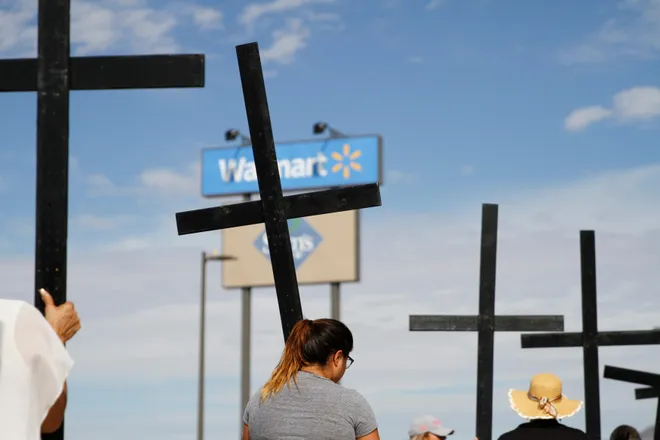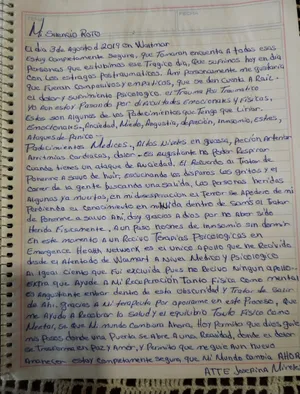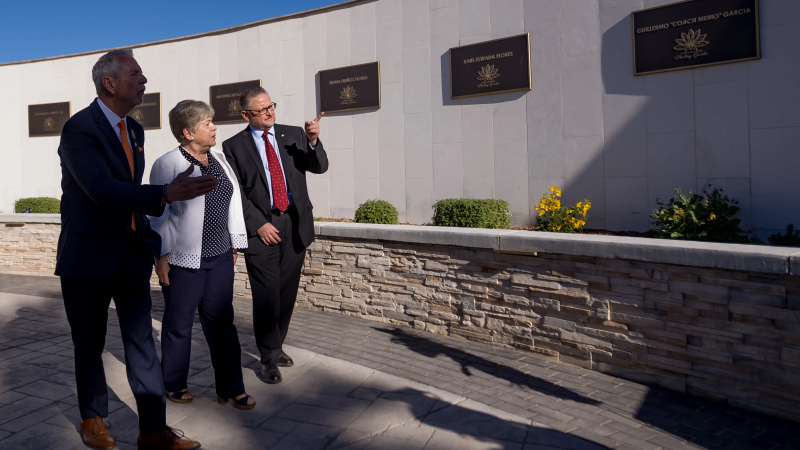'Terror took over': Mexican survivors of US shooting share letters 5 years on
EL PASO, Texas – Anxiety, fear, anguish, depression, insomnia, stress, panic attacks.
In a lined notebook, Josefina Mireles itemized in blue pen the list of symptoms she still wrestles with five years after surviving the Aug. 3, 2019, mass shooting at a Walmart here. It was the deadliest attack on Hispanics in modern U.S. history. Carrying a semiautomatic rifle, the shooter drove 700 miles from a Dallas suburb to kill "Mexicans."
Twenty-three people died, and dozens were injured.
Mireles was among the tourists from Mexico shopping that Saturday morning at a store so close to the U.S.-Mexico border that Ciudad Juárez is visible from the parking lot. Like many of the Mexican nationals at the store that day, she agreed to cooperate with U.S. law enforcement and sought a special visa to help her do just that.
She and 49 other Mexican survivors of the shooting are still waiting for an answer.

In letters collected by their immigration attorneys and shared with USA TODAY, four survivors described the traumas they still face and plea with the U.S. government to review their petitions – which are stuck in a backlog of more than 344,000 applications nationwide.
"It's frustrating to not be able to breathe when you have an anxiety attack," Mireles wrote, recalling the horror she witnessed, in a letter provided to El Paso's Las Americas Immigrant Advocacy Center. "The memory of trying to get safe as I fled, hearing the shots and the screams and the people running for a way out, the wounded, some of them already dead, terror took over me and I lost awareness as I fled."
A visa designed to make communities safer
Congress created the U visa two decades ago. It's meant to provide stability for immigrant victims of crime who have suffered mental or physical abuse and who agree to help law enforcement investigate and prosecute crimes.
The U visa doesn't allow a path to citizenship but it does allow victims to live and work lawfully in the U.S.

"Congress created the U visa certification process to encourage immigrant victims of crimes to come forward and cooperate with law enforcement, recognizing that all cooperation makes communities safer for everyone within our borders," said Elora Mukherjee, a law professor at Columbia University.
But congress capped the number of U visas issued annually at 10,000. A U.S. Citizenship and Immigration Services spokesman said the agency has met the cap each of the past 15 years.
More:White supremacist to spend rest of life in prison for 2019 Walmart mass shooting
"It’s an overprescribed program and the backlog keeps getting longer and longer," said Allegra Love, supervising attorney for community programs at Las Americas. "The tradeoff isn’t happening. They are participating in prosecuting crimes and our government isn’t providing them with any tangible (immigration) benefit."
In 2021, the Biden administration created a process by which U.S. Citizenship and Immigration Services agents can review U visa applications, determine whether an applicant qualifies for relief and issue a temporary work authorization while the applicant waits. The process, called a bona fide determination, can also protect the applicant from deportation.
The circumstances of the El Paso shooting victims vary.
Some are traumatized or physically injured and need access to the mental health and physical therapy services they can only get in the United States, said Love. Others just want the opportunity to live or work in the U.S. that the U visa affords, given that they cooperated with law enforcement. In some cases, the cooperation is ongoing.
“I think they suffered,” Love said. “They did their end of the bargain in terms of supporting law enforcement in this huge tragedy.”
'Any instance or image makes us remember'
The letters share a common thread: memories of trauma experienced in Texas, and a desire to return to with the right to live, work or study. All but one of the families who have applied for the U visa after the shooting live in Mexico.

Jazmin Ávila Rodriguez said her family of five witnessed the Walmart shooting. Five years on, they are still triggered by the memories of that day.
"Being there, having all my family members witness the act, hasn't been an easy process," she wrote in a narrow notebook using polite, formal Spanish. "Any instance or image makes us remember the moment given that it was traumatic to watch it happen, to see so many victims, people hurt or killed."
She brings her kids to therapy, she wrote. The family talks about what they went through, to deal with the trauma together.
"It's for this reason that we ask," she said, "in the most sincere manner, to be heard in our petitions."
Lauren Villagran can be reached at lvillagran@usatoday.com.
Disclaimer: The copyright of this article belongs to the original author. Reposting this article is solely for the purpose of information dissemination and does not constitute any investment advice. If there is any infringement, please contact us immediately. We will make corrections or deletions as necessary. Thank you.



